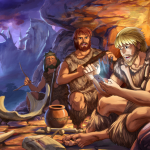
The Savage Blueprint: How Evolutionary Psychology Holds the Key to Understanding Human Chaos
Apr 15, 2025
Warning: You are not the rational creature you believe yourself to be. Your instincts are ancient, raw, and unfiltered. Beneath the thin veneer of civility, your brain is a battlefield—a war between primal impulses and modern illusions. And the terrifying truth? You are not in control. The herd mentality that drives financial panics, the irrational fears that shape entire societies, and the subtle forces that dictate your relationships are all governed by the same ruthless architecture. To see it, to master it, you need more than logic. You need an evolutionary psychology book that rips the mask off your humanity and forces you to confront what lies beneath.
Every decision you make, every impulse you feel, is the product of millions of years of survival programming. You weren’t built to thrive in skyscrapers or stock markets. You were built to survive on the savanna, to navigate a world of predators, scarcity, and constant danger. The problem? That ancient circuitry is still running the show, even as the world around you has evolved into something unrecognizable. The result? Chaos. Contradiction. Collapse.
The Anatomy of Panic: Why We’re Hardwired to Fail
Panic isn’t an accident. It’s a feature. It’s the ghost of your evolutionary past, screaming at you to run, to conform, to survive at any cost. But in the modern world, this ancient survival mechanism isn’t just outdated—it’s dangerous. When markets crash, when mobs form, when fear spreads like wildfire, it’s your limbic system that takes the wheel. Logic? Gone. Rationality? Out the window. You’re no longer an individual—you’re a node in a stampeding herd.
Consider the financial crises of history. In 2008, as the global economy teetered on the brink, it wasn’t just bad loans or toxic assets that drove the collapse—it was fear. Traders dumped assets in a frenzy, not because of data, but because of cortisol. They weren’t analyzing—they were reacting, their brains hijacked by the same fight-or-flight response that kept their ancestors alive against lions and wolves.
And it’s not just markets. The same evolutionary forces drive everything from political upheavals to social media hysteria. Mirror neurons amplify the panic, cognitive dissonance locks people into irrational beliefs, and the herd mentality ensures that the majority will always follow, even if it means running off a cliff. This is the dark truth revealed by any great evolutionary psychology book: your instincts, once your greatest asset, are now your greatest liability.
The Wolves Move Different: Mastering the Ancient Mind
But not everyone succumbs. While the herd panics, the wolves—the contrarians, the bold, the few—move differently. They understand the game at a deeper level. They know that human behavior isn’t random; it’s predictable, governed by the same evolutionary rules that have shaped our species for millennia.
Take Jesse Livermore, the legendary trader who built and lost fortunes by understanding the psychology of the market. Livermore didn’t just analyze numbers—he analyzed people. He knew that fear and greed weren’t anomalies; they were constants, baked into the human condition. The same can be said of Ray Dalio, who built an empire by reducing chaos to principles. These are the wolves who don’t just survive the storm—they thrive in it, because they see the patterns that others miss.
Modern evolutionary psychology offers the same tools. It reveals the hidden algorithms of your brain—the shortcuts, biases, and heuristics that determine your every move. It shows you how to spot the cracks in the system, the moments when the herd is most vulnerable, and how to exploit them. A great evolutionary psychology book doesn’t just teach you about the past—it gives you a blueprint for mastery, for rising above the chaos and taking control.
Fear as Fuel: The Power of Understanding Instinct
Fear is not the enemy. Fear is fuel. It’s the raw energy that drives human behavior, and when harnessed correctly, it becomes a weapon. But to wield it, you must first understand it. Evolutionary psychology teaches you to decode fear, to see it for what it truly is: an ancient survival mechanism repurposed for a world it no longer fits.
Here’s where the paradox comes in. Fear is both your greatest enemy and your greatest ally. It drives the herd to panic, to overreact, to make irrational decisions. But for those who understand its mechanics, fear creates opportunity. When the masses flee, the wolves advance. When the market crashes, the contrarians buy. This is the lesson of evolutionary psychology: to master fear, you must first embrace it.
Think of it as a chemical reaction. Fear is the catalyst, the volatile spark that ignites action. But without control, it leads to chaos. The wolves know how to channel that energy, to turn short-term volatility into long-term opportunity. They understand that fear, when properly managed, is not a weakness—it’s a superpower.
Calculated Aggression: The Art of Controlled Chaos
Boldness without discipline is recklessness. Discipline without boldness is paralysis. The wolves walk the line between the two, moving with calculated aggression. They understand that to win, you must take risks—but only when those risks are measured, intentional, and grounded in reality.
Evolutionary psychology provides the framework for this balance. It teaches you to recognize the biases that cloud your judgment, the instincts that push you toward impulsive decisions. It shows you how to strip away the noise, to focus on the signal, and to act with precision when the moment demands it.
This is the key: calculated aggression is not about acting on impulse—it’s about acting on insight. It’s about understanding the system, seeing the patterns, and moving with purpose. Whether you’re navigating markets, relationships, or life itself, the principles remain the same. The wolves don’t just survive—they dominate because they’ve mastered the art of controlled chaos.
The Exit Velocity of Independence
At its core, evolutionary psychology is about freedom. Freedom from fear, from conformity, from the mental prisons that keep you trapped. It’s about understanding the forces that shape your behavior, and using that knowledge to break free from the herd.
When you read a great evolutionary psychology book, you’re not just learning about the past—you’re charting a course for the future. You’re gaining the tools to see the world as it truly is: a battlefield of competing instincts, a dance of chaos and order, a system of contradictions that only the bold can navigate.
This is the ultimate paradox: to gain control, you must first surrender to the truth of your nature. To escape the chaos, you must first understand it. But once you do, the world opens up in ways you never imagined. You see the patterns, the opportunities, the moments when the system is most vulnerable. And in those moments, you act—not as a follower, but as a leader. Not as prey, but as predator.
So, the next time you find yourself gripped by fear, remember this: it’s not the end. It’s the beginning. The herd will always react, always follow, always panic. But you don’t have to. You can rise above it. You can master it. You can become the wolf.










